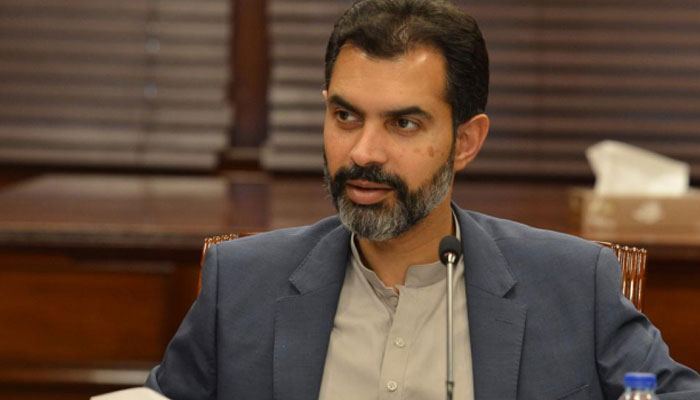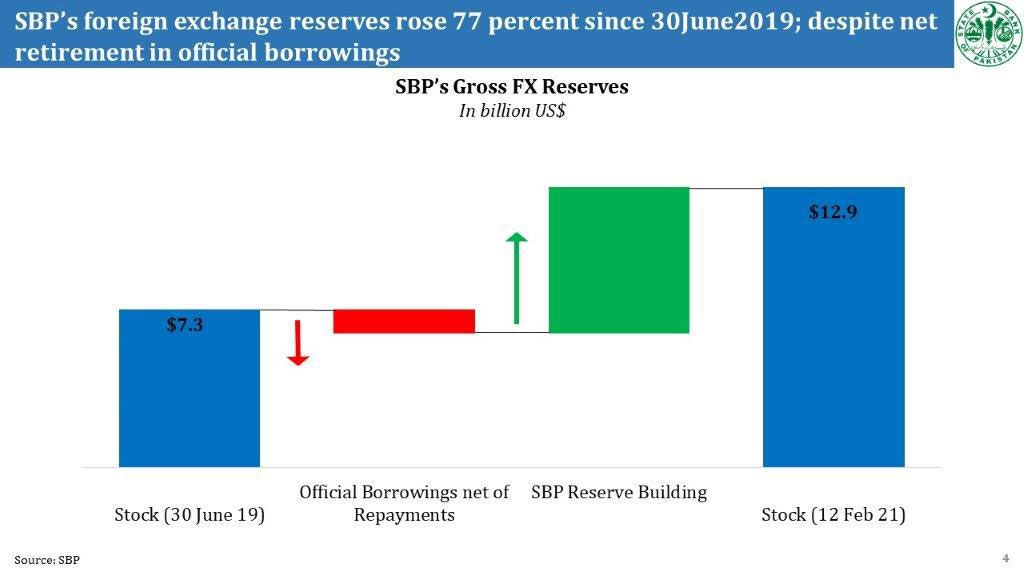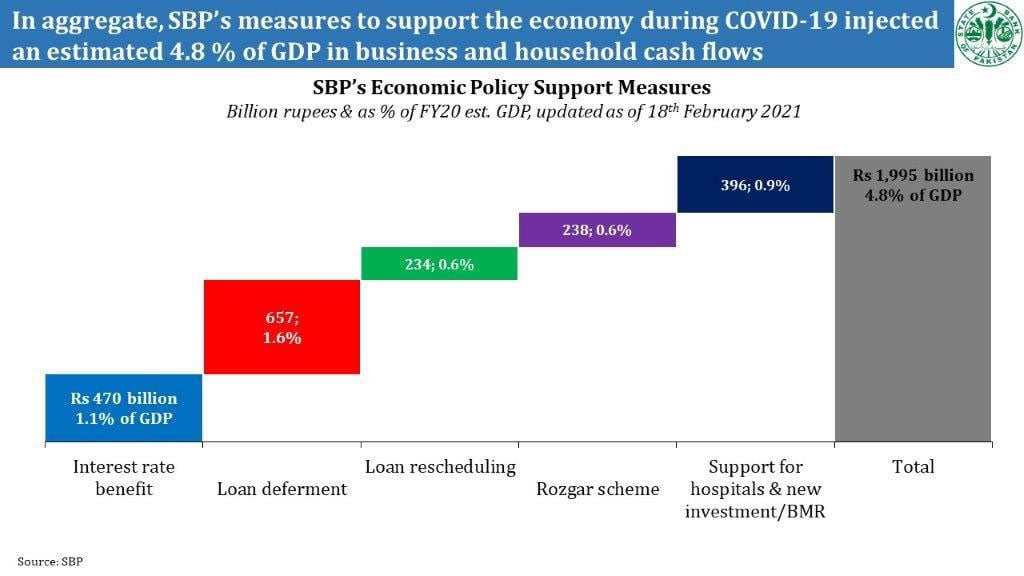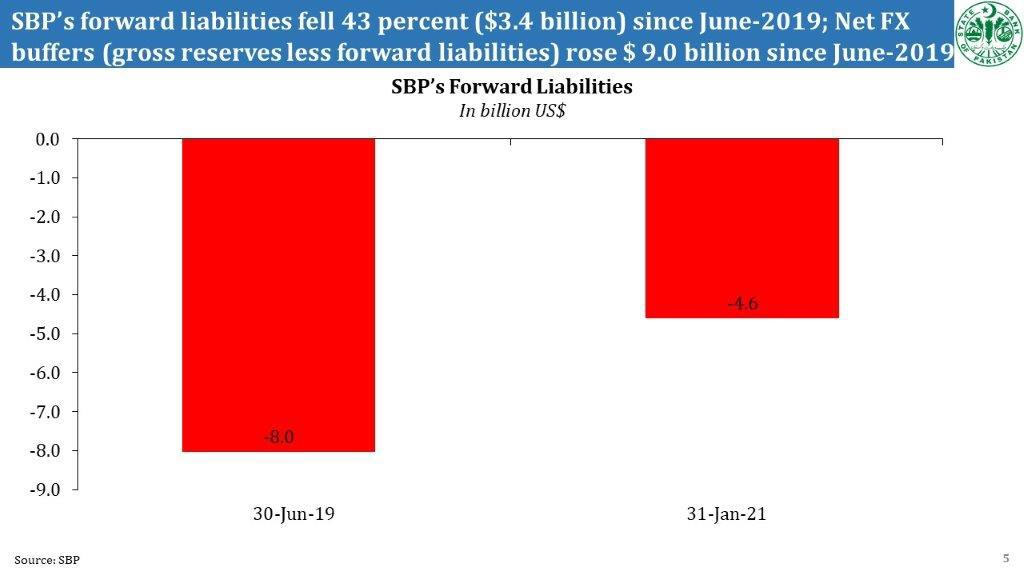Flawed exchange rate resulted in de-industrialisation: Raza Baqir
It was the crux of one-hour-long discussions with the Governor State Bank of Pakistan Dr Reza Baqir who gave an interview to The News here at the SBP Office in Islamabad on Friday.
ISLAMABAD: The State Bank of Pakistan (SBP) has provided a 'stimulus package' of Rs2 trillion or 4.8 percent of GDP for extending support to businesses and household cash flows after the COVID-19 pandemic at a time when the IMF program was on hold.
It was the crux of one-hour-long discussions with the Governor State Bank of Pakistan Dr Reza Baqir who gave an interview to The News here at the SBP Office in Islamabad on Friday.
The governor SBP dwelt upon various issues, including converting current account deficit into surplus, placement of exchange rate mechanism on basis of market based mechanism, measures taken by the SBP to mitigate negative effects of COVID-19 pandemic and many other issues.
Dr Reza Baqir said that billions of dollars were spent in Pakistan every time when the country experienced external account imbalance, so the foreign exchange reserves were utilized to keep the exchange rate artificially stable. This flawed exchange rate resulted into de-industrialization as imports became cheaper, having no incentives for entrepreneurs for making investment. He said that the SBP forward liabilities fell by 43 percent equivalent to $3.4 billion since June 2019, so net forex buffer (gross reserves less forward liabilities) rose to $9 billion in the last one and a half year period.
When asked about the revival of IMF program with regard to combination of the second to fifth review and possibility of release of only $500 million linked with approval of Fund’s executive board, he said that the biggest benefit for going into the IMF program was not the size of loan program but it gives message to international community that according to assessment of an independent financial institution, all economic policies are running in good and smooth manner, so it restores confidence in the country. Because of this signaling, all multilateral creditors the World Bank, Asian Development Bank and other bilateral creditors started lending money and it resulted into ‘seal of good house keeping’, he added.
Pakistan had also obtained $1.4 billion from the IMF under the Rapid Finance Instrument (RFI) that was over and above the existing IMF program, so it comes close to $2 billion. He said the revival of the IMF program would pave the way for release of other remaining tranches and money would also pour into from other creditors.
When asked for inflationary projections for the current fiscal year, he said that it was hoped that the food price would come down in the country as the government took steps for improving the supply situation related to wheat and sugar. He also pointed out that the country required boosting up productivity of the agriculture sector.
The COVID-19 like test had never come into the history of Pakistan and uncertainty gripped and business giants seemed worried when they visited the State Bank of Pakistan. First of all, the SBP decided that business as usual approach would not work to respond to this massive crisis and secondly they decided to rectify schemes keeping in view the feedback of businessmen.
Under the Rozgar Scheme, he said the SBP introduced a scheme for providing loans to those entrepreneurs who would not lay off their employees in the aftermath of COVID-19 pandemic and so far approved Rs238 billion and disbursed Rs212 bn. Almost 50 percent of these entities are small and medium enterprises. The loan deferment scheme provided a deferred principal loan amount of Rs657 billion. On mark-up, the deferred amount stood at Rs234 billion through restructuring of loan. For providing support to hospitals to combat Covid, a refinancing scheme by the SBP provided Rs10 billion loan. In March 2020, the SBP introduced Temporary Economic Refinance Facility (TERF) for those new investments that would open their letter of credit before March 2021. So far, the sanctioned amount stood at Rs385 billion at the rate of 5 percent for 10 years period. A key feature of this scheme is that there is no interference of the government or the SBP on the decision of banks for approving loans and recalled that problems had emerged in case of DFIs in the past in the wake of increased political influence. He said keeping the exchange rate artificially stable resulted into de-industrialization as a new wave of industrialization supported by TERF was on its way as investment rate would go up by approximately 1 percent of GDP and positive impact would start appearing on the economic horizon of the country. The interest rate was brought down by 625 basis points so interest income reduced by Rs470 billion.
In totality, the SBP measures provided a total Rs2 trillion in liquidity support for different sectors of the economy after the outbreak of COVID-19 pandemic.
When asked how much foreign currency reserves were thrown into the open market for keeping the exchange rate stable during the last PML-N led regime, he replied that it was not the first time but every time when Pakistan approached the IMF, it had witnessed nose-diving of foreign exchange reserves. Time and again billions of dollars were wasted for keeping the exchange rate artificially stable. It should not be kept in mind only on account of foreign currency reserves or exchange rate but it hurts and affects export prices and result into making it in competitiveness. It converts imports cheaply. Everything was being imported and our entrepreneurs were not able to get a fair market level because of flawed exchange rate mechanisms.
The Governor SBP, Dr Reza Baqir, said that he had learnt a lesson from his 18 years experience at the IMF that whenever emerging markets of the world witnessed a crisis, the basic reason was an increase in current account deficit. If you analyze the world history of the last 50 years, you would come to know that the yawning current account deficit resulted in external crisis in all parts of the world, he added. In Pakistan, the current account deficit had touched $19 billion mark in 2018-19 but now it had converted from a deficit into a surplus. This deficit, he said, was converted from a deficit into surplus, so that the economic vulnerability ends through an institutional arrangement. It was not done through “temporary or stop gap arrangement” but it was done through adopting a market based exchange rate mechanism. In case of yawning trade and current account deficit, the SBP used to utilize its foreign exchange reserves to keep fixed exchange rate but in this process, the crisis had emerged and no option was left but to go back to the IMF. He said that in June 2019, the exchange rate was placed on a market based mechanism instead of running it in an artificial manner on the basis of supply and demand.
It was my experience while working in the IMF that countries generally showed reluctance to introduce an exchange rate on the basis of market based mechanisms because of fear of free floating as they did not know where it would be standing after free floating. There were apprehensions that the exchange rate would go out of control and would touch sky when the SBP made exchange rate on the basis of market based. In Pakistan’s case, the exchange rate got stabilized after undertaking institutional reforms. The exchange rate strengthened and remained at Rs154 against a dollar in pre COVID-19 situation. The institutional reforms undertaken for exchange rate witnessed the biggest test in the shape of COVID-19 pandemic as Turkey’s exchange rate depreciated by 15 percent to-date since the beginning of the Covid crisis in January 2020, Russian currency 17 percent, Brazilian currency weakened by 23 percent but Pak Rupee depreciated by just 9 percent as it went from Rs154 against a dollar to Rs168 but now it stood at Rs159-160 at the moment.
“We have passed the test of exchange rate in a good manner in the aftermath of COVID-19 pandemic as the exchange rate adjusted in an orderly manner despite difficult times on the economic front. If we have survived well the test of COVID, any other challenges will be easier to handle. He said that the exchange rate ran orderly but foreign exchange reserves went up from $7 billion June 2019 to $13 billion now.
The net international reserves (NIR) from June 2019 to December 2020 increased $9 billion in one and a half year period, showing that the gross reserves went up by $7 billion but the NIR increased by $9 billion, so the SBP retired more than $2 billion in liabilities. He said that he wanted to give a message to the youth of Pakistan that the country got stability on the foreign exchange front, so the situation was ripe for making investments in different sectors of the economy.
Regarding the Roshan Digital Accounts, he said that first of all, the SBP placed regulatory regime through digital means for ensuring Know Your Customers (KYC) and Customers Due Diligence (CDD) through digitally as the overseas Pakistanis were not required to go into premises while sitting abroad. Secondly, these accounts were repatriable, making it crystal clear there was no need to get permission from the SBP for sending back money abroad. We changed it because in the past it was easy to bring in money but difficult to remit out. Thirdly, it allowed lifestyle banking accounts such as payment of bills, making investment into the Shariah compliant Islamic saving certificates, stock market and purchase real estate. “It’s compliant with the international requirements for customer due diligence,” he added.
“Roshan Digital Accounts have so far attracted $500 million in the last five months out of which $243 million was received in the last six-week period,” he said. This money was received from 97 countries by over 88,000 overseas Pakistanis. There are 7 to 9 million Pakistanis living abroad and, so far, 88,000 opened their accounts. When asked about the target, he did not share any figure but said that they would continue facilitating Pakistanis living abroad to attract their money. The government has found a solution if you buy a Pakistan Saving Certificate or you invest into the stock market or purchase a real estate plot, your tax would be deducted at source and it would be full and final tax. There will be no need to file any income tax return if you don’t have any other income.
Regarding remittances, he said that there was a general phenomenon that whenever a crisis erupted, the flow of remittances increased as it was experienced on the eve of global financial crisis. He said that they undertook the Pakistan Remittance Initiative (PRI) and incentives for banks in the shape of rebates was jacked up, so it also played a positive role. The travel restrictions also helped curtail Hundi/Hawala and it is our hope that the people would continue to stick to the path of sending money through formal channels.
-
 Katie Price Seen With New Hubby Lee Andrews Weeks After Tying The Knot
Katie Price Seen With New Hubby Lee Andrews Weeks After Tying The Knot -
 Biggest Order Yet Issued Against Andrew Mountbatten-Windsor: King Charles You Have To’
Biggest Order Yet Issued Against Andrew Mountbatten-Windsor: King Charles You Have To’ -
 ByteDance’s Seedance 2.0 Marks New Era Of Cinematic AI-generated Videos: Here’s How
ByteDance’s Seedance 2.0 Marks New Era Of Cinematic AI-generated Videos: Here’s How -
 Struggling With Obesity? Here's How To Manage It
Struggling With Obesity? Here's How To Manage It -
 How Epstein Scandals Are Impacting King Charles’ Healing As Stress Refuses To Relent: ‘Could Spell His End’
How Epstein Scandals Are Impacting King Charles’ Healing As Stress Refuses To Relent: ‘Could Spell His End’ -
 Ciara, Russell Wilson Become Matchmakers For Pals?
Ciara, Russell Wilson Become Matchmakers For Pals? -
 Why Prince William Releases Statement On Epstein Scandal Amid Most 'challenging' Diplomatic Trip?
Why Prince William Releases Statement On Epstein Scandal Amid Most 'challenging' Diplomatic Trip? -
 Historic Mental Health Facility Closes Its Doors
Historic Mental Health Facility Closes Its Doors -
 Top 5 Easy Hair Fall Remedies For The Winter
Top 5 Easy Hair Fall Remedies For The Winter -
 Japan Elections: Stock Surges Record High As PM Sanae Takaichi Secures Historic Victory
Japan Elections: Stock Surges Record High As PM Sanae Takaichi Secures Historic Victory -
 Prince William, Kate Middleton Finally Address Epstein Scandal For First Time: 'Deeply Concerned'
Prince William, Kate Middleton Finally Address Epstein Scandal For First Time: 'Deeply Concerned' -
 Kim Kardashian Promised THIS To Lewis Hamilton At The 2026 Super Bowl?
Kim Kardashian Promised THIS To Lewis Hamilton At The 2026 Super Bowl? -
 Andrew Mountbatten-Windsor Throws King Charles A Diplomatic Crisis
Andrew Mountbatten-Windsor Throws King Charles A Diplomatic Crisis -
 Barack Obama Hails Seahawks Super Bowl Win, Calls Defense ‘special’
Barack Obama Hails Seahawks Super Bowl Win, Calls Defense ‘special’ -
 Pregnant Women With Depression Likely To Have Kids With Autism
Pregnant Women With Depression Likely To Have Kids With Autism -
 $44B Sent By Mistake: South Korea Demands Tougher Crypto Regulations
$44B Sent By Mistake: South Korea Demands Tougher Crypto Regulations







